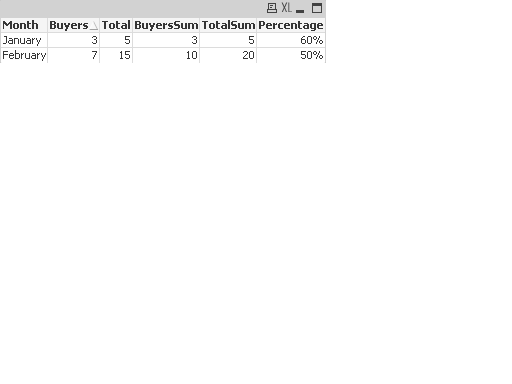Unlock a world of possibilities! Login now and discover the exclusive benefits awaiting you.
- Qlik Community
- :
- All Forums
- :
- QlikView App Dev
- :
- How to create a cumulative percentage by month ?
- Subscribe to RSS Feed
- Mark Topic as New
- Mark Topic as Read
- Float this Topic for Current User
- Bookmark
- Subscribe
- Mute
- Printer Friendly Page
- Mark as New
- Bookmark
- Subscribe
- Mute
- Subscribe to RSS Feed
- Permalink
- Report Inappropriate Content
How to create a cumulative percentage by month ?
Hi everyone,
This is my first post on the qlik community
I try to have the percentage of buyers of a product vs a set of product ({<Product=p(ProductParent)>}) cumulative by month
if it was not cumulative, i could use this function. : =sum(buyer)/sum({<Product=p(ProductParent)>}buyer)
Exemple with only 2 Months
January : 3 buyers vs 5 in total
February : 7 buyers vs 15 in total
i would like to have a table with
January 60% (3/5)
February 50% ((3+7)/(5+15))
At the end, i should be able to select any range of Months.
Do you have an Idea how to proceed ?
For information:
I put Month variable in Dimension of my table but i don't think is a good idea.
I try to modify SetExpression but it seems it applies to all the table and not just on the Month category.
I can't create all possibilitites of cumulative Months
But maybe can I create a calculated dimension which represents cumulative Month ? ==> but i don't know how to proceed ![]()
Thank you for your answers. ![]()
- « Previous Replies
-
- 1
- 2
- Next Replies »
Accepted Solutions
- Mark as New
- Bookmark
- Subscribe
- Mute
- Subscribe to RSS Feed
- Permalink
- Report Inappropriate Content
Create a Straight Table
Dimension
Month
Expression as Below
RangeSum(Above(COUNT(Product),0,RowNo()))/RangeSum(Above(COUNT({<Product = , Month = {'>=$(=Min(Month))<=$(=Max(Month))'}>}Product),0,RowNo()))
- Mark as New
- Bookmark
- Subscribe
- Mute
- Subscribe to RSS Feed
- Permalink
- Report Inappropriate Content
have you tried with Total in your expression ?
- Mark as New
- Bookmark
- Subscribe
- Mute
- Subscribe to RSS Feed
- Permalink
- Report Inappropriate Content
Provide sample data or apps please...!
- Mark as New
- Bookmark
- Subscribe
- Mute
- Subscribe to RSS Feed
- Permalink
- Report Inappropriate Content
Yes I tried, but if i do that i will have the same result for both month which is
January 50% ((3+7)/(5+15))
February 50% ((3+7)/(5+15))
- Mark as New
- Bookmark
- Subscribe
- Mute
- Subscribe to RSS Feed
- Permalink
- Report Inappropriate Content
example with the correct formula if someone need it
- Mark as New
- Bookmark
- Subscribe
- Mute
- Subscribe to RSS Feed
- Permalink
- Report Inappropriate Content
yea, waiting for it
- Mark as New
- Bookmark
- Subscribe
- Mute
- Subscribe to RSS Feed
- Permalink
- Report Inappropriate Content
Hi Benjamin
You can Achieve this result using something like this in your script:
Final:
Load *,
Num(Num(BuyersSum)/Num(TotalSum),'#,##0%') AS Percentage;
Load
Buyers,
Month,
Total,
alt(peek(BuyersSum),0) +Buyers as BuyersSum,
alt(peek(TotalSum),0) +Total as TotalSum;
Load * Inline [
Month, Buyers, Total
January, 3, 5
February, 7, 15
];
Copy the Script in your Edit Script and Run it. See the Result. It should be same as below. Also, see the Attachment.

- Mark as New
- Bookmark
- Subscribe
- Mute
- Subscribe to RSS Feed
- Permalink
- Report Inappropriate Content
Yes it's a good idea.
But the problem is that the user shoud be able to select other range of date
Example : November 2013 to March 2014.
So i don't think it could be implemented.
Thanks for Helping.
- Mark as New
- Bookmark
- Subscribe
- Mute
- Subscribe to RSS Feed
- Permalink
- Report Inappropriate Content
Create a Straight Table
Dimension
Month
Expression as Below
RangeSum(Above(COUNT(Product),0,RowNo()))/RangeSum(Above(COUNT({<Product = , Month = {'>=$(=Min(Month))<=$(=Max(Month))'}>}Product),0,RowNo()))
- Mark as New
- Bookmark
- Subscribe
- Mute
- Subscribe to RSS Feed
- Permalink
- Report Inappropriate Content
it look like it is working fine ![]() .
.
I try to figure how it work exactly and i see if it apllies to my study.
Thanks a lot.
I am doing some tests and it seems this part of the formula is not useful :
, Month = {'>=$(=Min(Month))<=$(=Max(Month))'}
and i think is normal, it will always return the same thing.
And why using this it the division and not in the numerator ?
Am i wrong ? is this part is mandatory ?
Still triyng to undersand the rest of the formula ![]()
- « Previous Replies
-
- 1
- 2
- Next Replies »